Cockatiels have sensitive digestive systems, and certain human foods can harm them over time.in this guide you will discover 12 Foods That Can Kill Your Cockatiel Slowly: Must Avoid Now highlights the foods to avoid, keeping your feathered friend safe and healthy.
Table of Contents
Why Certain Foods Are Dangerous for Cockatiels

Cockatiels have delicate digestive systems, which means certain human foods can be highly toxic to them. While some foods may seem harmless to us, they can slowly poison your bird over time. Understanding which foods are dangerous is key to keeping your feathered friend healthy. Feeding the wrong foods can lead to long-term health problems or even be fatal for your cockatiel. This guide will help you identify which foods to avoid to ensure your cockatiel stays safe.
Avocados: A Hidden Danger

Avocados are one of the most dangerous foods for cockatiels. They contain a toxin called persin, which can cause heart problems, breathing issues, and even death in birds. Even a small amount of avocado can be deadly, so it’s crucial to keep this food far away from your cockatiel. If you enjoy avocados, make sure your bird is not exposed to any part of it, including the skin and pit.
Chocolate: More Than Just a Sweet Treat

Chocolate is another toxic food for cockatiels. It contains theobromine and caffeine, both of which are harmful to birds. Chocolate can cause seizures, heart arrhythmias, and respiratory failure in cockatiels. Even a small amount can be dangerous, so never offer your bird chocolate or any food that contains it. This is a food to completely avoid if you want to protect your cockatiel’s health.
Caffeine: Harmful for Cockatiels

Caffeine, found in coffee, tea, and certain sodas, is extremely harmful to cockatiels. It can overstimulate their heart and nervous system, leading to hyperactivity, seizures, and even death. Birds are highly sensitive to caffeine, so it’s important to keep all caffeinated beverages away from your cockatiel. Always ensure their water source is clean and caffeine-free.
Salt: Too Much Can Be Deadly
While salt is a common part of our diets, it’s incredibly dangerous for cockatiels. Birds don’t have the ability to process large amounts of salt, and consuming too much can lead to dehydration, kidney problems, and even death. Never offer salty snacks like chips or pretzels to your bird, and be cautious of hidden salts in other foods. A low-sodium diet is vital for your cockatiel’s health.
Onions and Garlic: Toxic for Birds

Onions and garlic are toxic to cockatiels and should never be part of their diet. These vegetables contain compounds that can cause digestive problems, anemia, and even death in birds. Cooked or raw, onions and garlic are both equally dangerous, so it’s important to avoid feeding them to your cockatiel in any form. This also applies to foods that contain onion or garlic powder.
Alcohol: Never Safe for Cockatiels
Alcohol is extremely dangerous for cockatiels and other birds. Even a small amount can cause serious health problems, including disorientation, difficulty breathing, and liver damage. Alcohol can also lead to death in birds due to their small size and fast metabolism. Never offer alcoholic drinks to your cockatiel, and keep all alcoholic beverages far out of reach.
Fruit Seeds and Pits: A Hidden Risk

Many fruits, like apples, cherries, and peaches, contain seeds or pits that are toxic to cockatiels. These seeds contain small amounts of cyanide, which can build up in your bird’s system and cause poisoning over time. Always remove seeds and pits before offering fruit to your cockatiel. While the flesh of the fruit is safe, the seeds are not.
Raw Meat and Fish: Not Suitable for Cockatiels

Raw meat and fish are not suitable for cockatiels and should be avoided. Birds can become sick from bacteria in raw meat, and they do not need meat as part of their diet. A diet rich in seeds, grains, fruits, and vegetables is best for cockatiels. Offering raw or cooked meat can lead to digestive problems and other health issues.
Dairy Products: Avoid Giving Them to Cockatiels

Dairy products, including milk, cheese, and yogurt, should be avoided in your cockatiel’s diet. Birds are lactose intolerant, meaning they cannot digest dairy properly. Consuming dairy can lead to digestive upset, diarrhea, and other health issues. While it might be tempting to share dairy treats, it’s best to keep them away from your bird.
Artificial Sweeteners: A Slow Poison

Artificial sweeteners, especially xylitol, are dangerous for cockatiels. These sweeteners can cause a drop in blood sugar, liver failure, and even death in birds. They are often found in sugar-free gum, candy, and some baked goods. Always check the ingredients of any food you offer to ensure it doesn’t contain harmful artificial sweeteners.
Processed Foods: Keep Away from Cockatiels
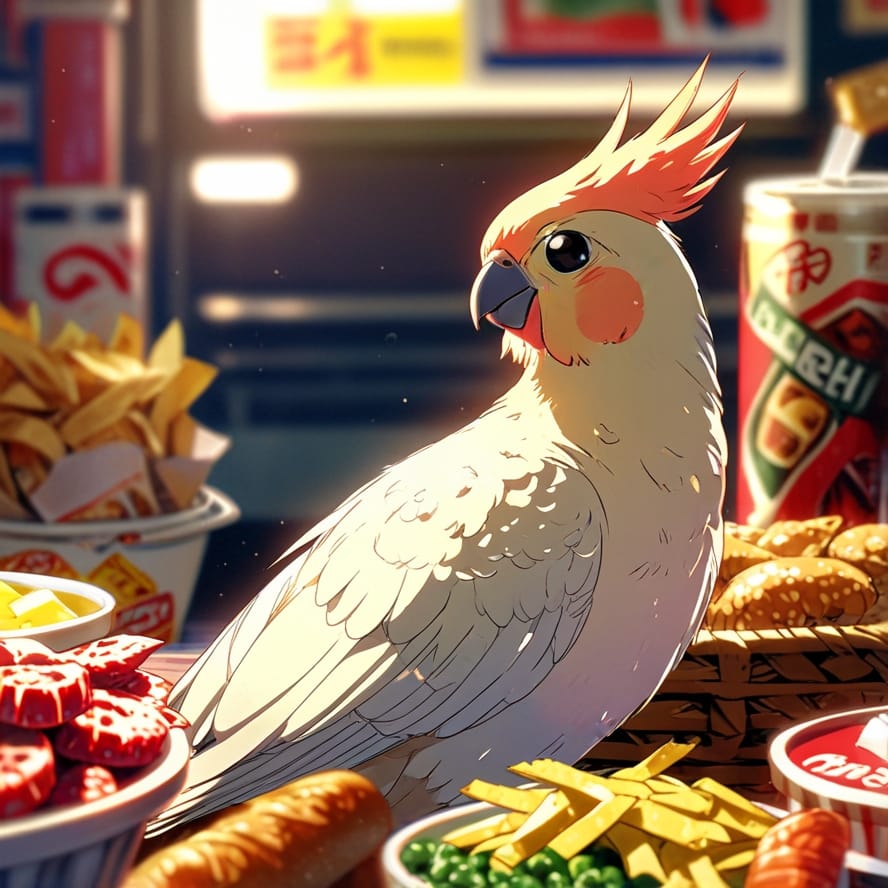
Processed foods like chips, cookies, and fast food contain high levels of salt, sugar, and preservatives, which are harmful to cockatiels. These foods can lead to obesity, liver disease, and heart problems over time. Cockatiels need a natural, balanced diet to stay healthy. Always avoid giving your bird any processed food, no matter how small the portion.
Fried Foods: Harmful for Your Bird

Fried foods, such as french fries or fried chicken, are high in unhealthy fats and oils, which can cause health problems for cockatiels. Consuming fried foods can lead to obesity, liver disease, and digestive issues. Birds have delicate digestive systems, and fried food can disrupt their health. Stick to offering fresh, nutritious options for your cockatiel.
How to Provide a Safe Diet for Your Cockatiel

To keep your cockatiel healthy, it’s important to provide a balanced diet consisting of fresh fruits, vegetables, seeds, and pellets, here are 3 recipes you cockatiel will like . Avoid foods that are toxic or unhealthy for birds. A variety of safe, nutrient-rich foods will help your cockatiel thrive. Always ensure fresh water is available and monitor your bird for any signs of illness. With the right diet, your cockatiel can live a long, happy life. check this video on YouTube

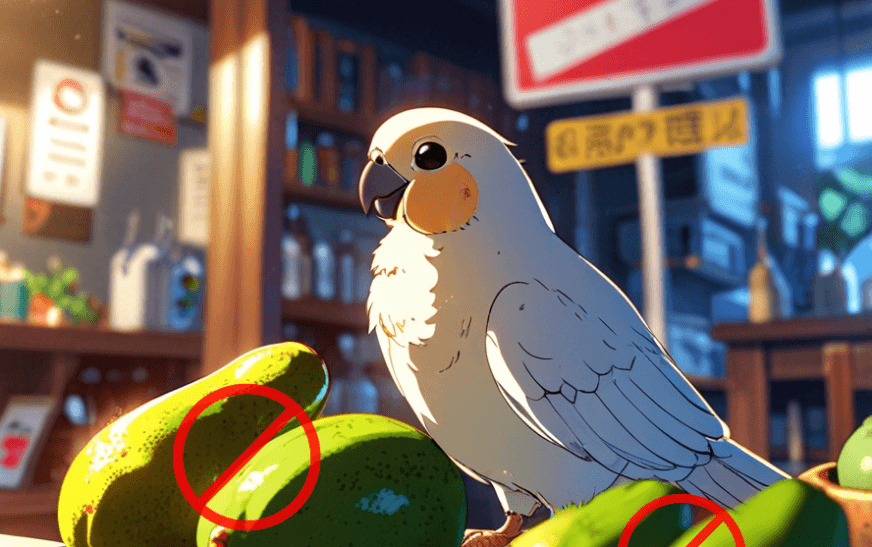




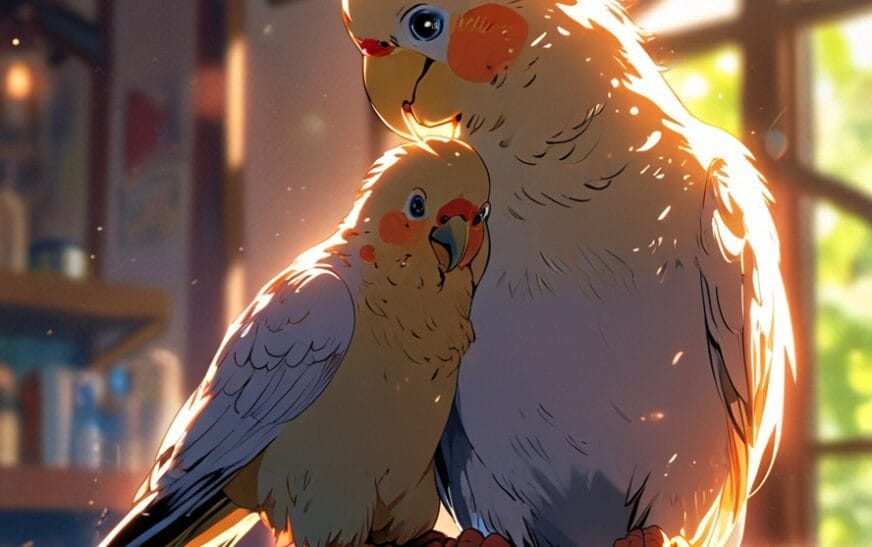






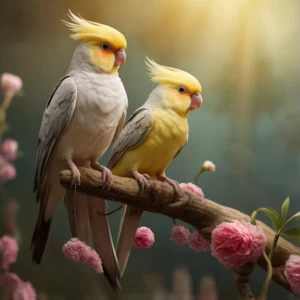
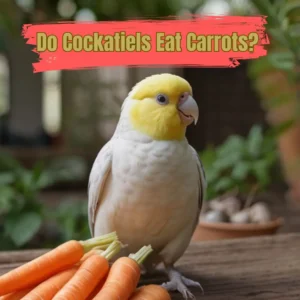
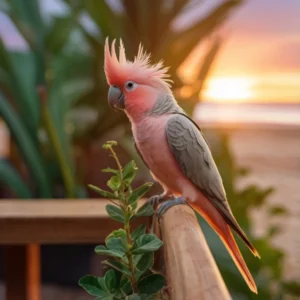
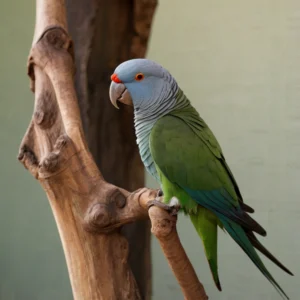
5 Comments
[…] Building a strong bond with your cockatiel takes time, patience, and understanding. By recognizing these eight signs of affection, you’ll be able to strengthen your connection and enjoy a fulfilling relationship with your feathered friend. Cockatiels may be small, but their love for their human companions is boundless.this post also is important for your cockatiel 12 Foods That Can Kill Your Cockatiel Slowly: Must Avoid Now […]
[…] Are cooked chickpeas safe for cockatiels?Yes, cooked chickpeas are safe for cockatiels if served in moderation. Make sure the chickpeas are plain, thoroughly cooked, and cooled before offering them to your bird. Avoid adding any salt, spices, or oils, as these can harm your cockatiel’s health. you can find in this post foods the may harm you Cockatiel […]
[…] 12 Foods That Can Kill Your Cockatiel Slowly: Must Avoid Now […]
[…] While offering nutritious food is important, it’s equally important to avoid harmful foods. Avocado, chocolate, caffeine, and onion are toxic to cockatiels. These foods can lead to poisoning and severe health complications. Stick to natural fruits, vegetables, and grains that are bird-safe. Always double-check before introducing a new food item to your cockatiel’s diet. 12 Foods That Can Kill Your Cockatiel Slowly: Must Avoid Now […]
[…] Not all vegetables are safe for cockatiels. Avoid feeding onions, garlic, avocado, and rhubarb, as they are toxic to birds. These foods can cause severe health issues or even death. Always research before offering a new food to your cockatiel and consult with an avian veterinarian if unsure. Keeping harmful foods out of your bird’s reach ensures their safety and well-being. Learn More about 12 Foods That Can Kill Your Cockatiel Slowly: Must Avoid Now […]